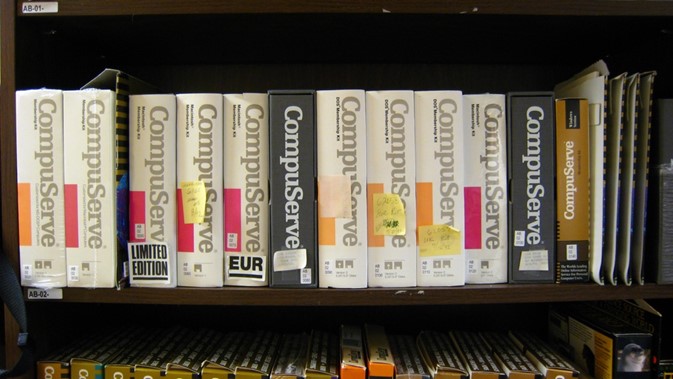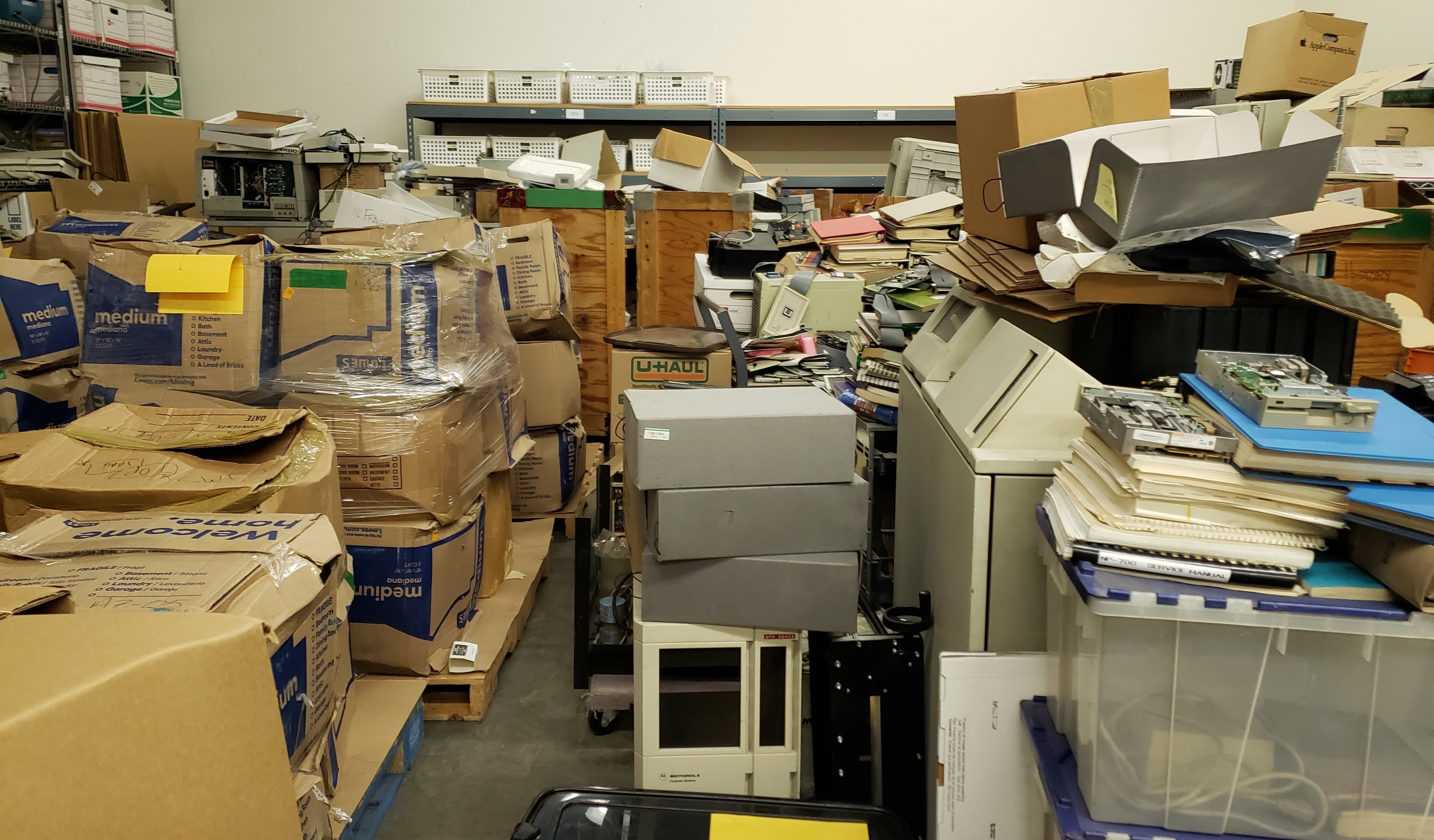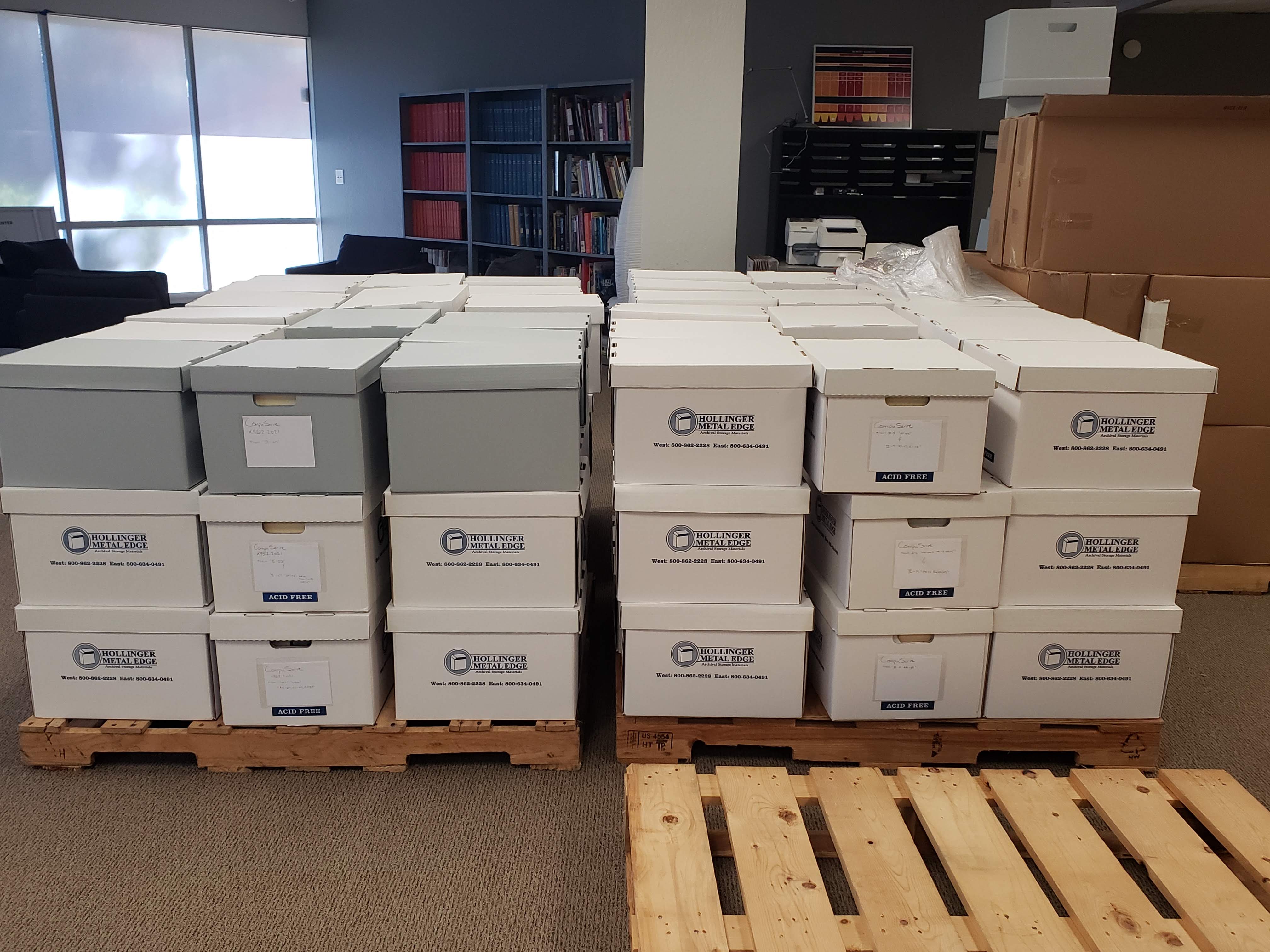
Today, CHM is often described as the home of the world’s preeminent computer history collection, and many generous donors reach out, hoping the Museum will accept their materials to preserve for posterity.
Once in a while, CHM collections’ staff encounter a desperate situation where exceptional historical materials are in imminent danger of destruction.
This is the story of how a small team of committed museum professionals and concerned employees rescued key records of online history, during a pandemic, in record time.
Back in the 1980s and 90s, before the internet was available to all, ordinary people got online through service providers like CompuServe. With over three million members, CompuServe was a vibrant community complete with social networking, news, e-commerce, personal ads, and email.
Over the years, the company was acquired by other companies. Marc Weber, CHM’s Internet History Program curator and director, often wondered where its records might have gone. Then he got an email from a web history contact offering CompuServe's official archives intact.
All was on track for the collection to come to CHM, at least until CompuServe got acquired yet again. Dave Eastburn, the archive's cofounder along with fellow former CompuServe executive Sandy Trevor, confirmed that CHM could still have the archive. But there was a catch. The building it was stored in had to be vacated by Labor Day… only weeks away!
The CompuServe storeroom was huge, chock-full of over 200 boxes worth of documents, brochures, software, and hardware. It contained a veritable treasure trove of all aspects of the early online world, a gold mine for sociologists, historians and business students. But the collection was 2,500 miles from California, Dave was in North Carolina and the Delta variant was everywhere. What to do?
The following is a rough reenactment of what happened.

CompuServe historic software; part of an archive that also included hardware, magazines, CD-ROMs, newsletters, advertisements, membership kids, radio ads, video broadcast commercials and more.
INT. MANY HOME OFFICES – DAY AND NIGHT
CHM COLLECTIONS STAFF sit glued to their computer screens reading email, biting their nails, and tearing their hair between fast and furious typing.
EMAIL DINGS
A ZOOM conference call begins.
COLLECTIONS MANAGER
(worried)
Do we have room for all of it? Do we even know how large it is? What does the collection actually contain?
ARCHIVIST
(embarrassed)
Where is it located again?
REGISTRAR
There’s almost every kind of corporate document, but do we want it all?
CURATOR
Hey, it’s just easier to take it all.
COLLECTIONS MANAGER
But how do we pack and move it? With the pandemic, it’s a shipping and logistics nightmare right now.
DAVE
(enthusiastically)
I can drive to Ohio and while I’m there in the storeroom, I’ll call you on Zoom and show you everything!
ACQUISITIONS REGISTRAR
That’s great! With Dave’s on-site help, and the blessings of remote tech, we can determine in real-time what’s most historically significant and should be saved.
COLLECTIONS MANAGER
So, do we have enough space to house it?
CURATOR
(urgently)
CompuServe is really important. We have to do this!
FADE OUT

This is not the ideal way to transport archival material, but during a global pandemic with supply chain problems it may be the best you can do.
OHIO STORAGE SITE – DAY
CHM ARCHIVIST working remotely in Michigan during the pandemic finds a brief window of time to buy boxes, packing tape, and Sharpies. She drives three hours to the Ohio site and reviews and packs everything not already boxed for shipping. Two additional helpers are found to help pack on the one day she has to complete this monumental task.
HOME OFFICES – DAY AND NIGHT
REGISTRAR works 24/7 to find a shipper. Not one but two companies commit to the job and then disappear when she tries to confirm details and make a down payment. With COVID and the general supply chain meltdown, this has become an especially challenging task.
BAY AREA ARCHIVIST struggles to make room for up to seven pallets of boxes by shifting materials in CHM’s loading dock/incoming collection’s quarantine area.
CURATOR asks peer institution the Internet Archive if they want the five giant bookshelves full of operations manuals—and they do. With their help the entire archive can be saved!
REGISTRAR struggles to arrange pre-payment for shipping when one truck driver requires half at pick up and another driver gets half at delivery, but neither will take the corporate credit card nor PayPal.
Pickup is the next challenge. Movers don't show up for a couple of pickup dates. The final chance for pick up is the Friday before the Labor Day deadline. Again, a no show. Will all be lost?
But there is a Plan B. CURATOR had left a deposit with a local moving company to pick up and store the boxes on Monday—just in case. With the help of former CompuServe programmers to identify materials, the local movers take the archive safely to their warehouse.
The interstate shipper finally collects the archive from the local mover's warehouse. But there's not enough room for everything on the truck... 60 boxes are left behind in storage!
FADE OUT

The first batch arrives at the CHM Shustek Research Archives after an epic journey. Here’s the rescued collection (boxes on left) in storage quarantine to check for pests.
INT. CHM ARCHIVES – SUNDAY, 7 AM
ARCHIVIST, REGISTRAR, NEW HUSBAND HELPER receive the shipment. They survey the battered and crushed boxes in the truck stacked seven boxes high with dismay.
The driver and local hired help unload the trailer. Staff set up six pallets to hold in collection’s quarantine to check for pests before entering the main building.
ARCHIVIST begins surveying and re-boxing the materials in pristine, new archival boxes.
REGISTRAR looks for a new shipper to move the boxes that remain in Ohio. Finally, they are on their way to the Museum.
Everyone leaves for a much-deserved winter vacation.
FADE OUT

Carefully transferred from damaged moving boxes and re-boxed into museum quality acid free boxes, the collection is now preserved at the Computer History Museum’s Shustek Research Archives.
INT. CHM ARCHIVES – DECEMBER 22, DAY
COLLECTIONS MANAGER arrives to receive the remaining material. She is relieved to see that the second delivery is perfect; the boxes are well-palletized and stable. The Internet Archive will pick up the operations manuals later for their collection.
Teamwork saves the day! The CompuServe collection has been saved from destruction. All feel immense satisfaction and look forward to cataloging the new collection for the next three years. But wait… a call comes in. Does another collection need to be rescued?
THE END
Stay tuned for the (inevitable) sequel to Mission Impossible: CHM Edition.
Blogs like these would not be possible without the generous support of people like you who care deeply about decoding technology. Please consider making a donation.